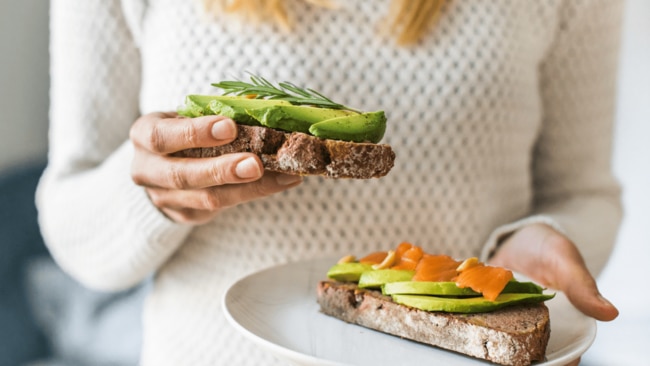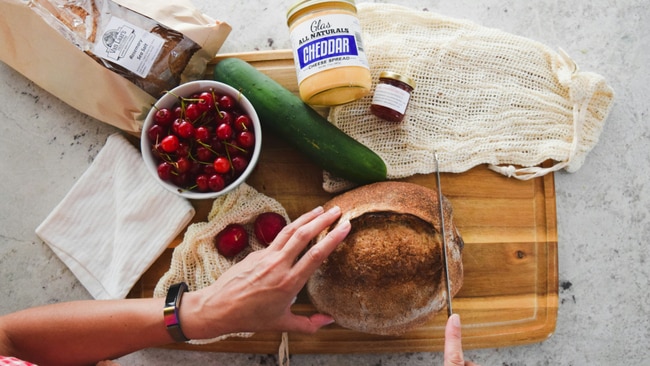What actually is Coeliac disease?
It's not looking good

Lifestyle
Don't miss out on the headlines from Lifestyle. Followed categories will be added to My News.
Do you know the difference between your garden variety gluten intolerance and coeliac disease? Laura Rosciolo, a self-suffering coeliac, asked the experts what to look out for, the most common symptoms, and why it happens.
When I was about 13 years old, I walked into my gastroenterologist's office eating a chocolate scone, blissfully unaware that my life would be forever changed. We’d been doing a bunch of tests to work out why my stomach acid was unusually high, causing me to constantly feel nauseous and unsettled. As I sat down, he looked at my half-eaten scone.
“You’d better enjoy that,” he said. Immediately my stomach dropped. I knew what was coming.
When he told me I had coeliac disease, at first I felt panic. What will my nonna think? What will I eat when I go to her house for dinner?
Then, came sadness. Warm wood-oven bread with olive oil and salt had long been my favourite snack, so much so that I’d always made the mistake of filling up on it before any of the other courses found their way to the table.
Then, denial. Surely they had it wrong? How can you love something so much and it not be good for you?
On reflection, that’s a pretty important life lesson. But at the time it all felt so unfair.

Back then, there were much fewer gluten-free options than there are now. Part of me is really glad that I learnt about it early on because since eating gluten-free, my body has felt so much better. Lighter, less groggy, a clearer mind and much less bloating. All those nights of heavy pasta dinners made my sore tummy make sense.
Today, being gluten intolerant or having coeliac disease is super common. It’s actually weird to go out to dinner with a group of people without at least one person at the table being a coeliac. But strangely enough, not many of us — even us actual coeliacs — know much about the ins and outs of the disease.
So, what is it? Let’s break down coeliac disease, in all its nuances.

What is coeliac disease?
“Coeliac disease is a common but under-diagnosed immune-based condition, triggered by gluten,” explains Kristina Richardson, an accredited practising dietitian, and Coeliac Australia’s health advocacy and research officer.
In those with coeliac disease, the body’s immune system reacts to gluten by attacking itself, she explains further.
Although it’s definitely more widely acknowledged today than it was when I was diagnosed back in 2008 – when it comes to eating out, especially – coeliac disease is far from new. Richardson says that it’s believed to have been around “since at least ancient Greek times”.
“The word ‘coeliac’ is derived from the ancient Greek word “Koliakos”, meaning ‘suffering in the belly’!”
Current statistics say that approximately one in 70 Australians have coeliac disease, with only 20 per cent of these actually being diagnosed. This means the vast majority of Australians who have coeliac disease don’t know it yet.
According to the Coeliac Disease Foundation, when people with coeliac disease eat gluten (which is a protein found in wheat, rye and barley), their body “mounts an immune response that attacks the small intestine”. These attacks lead to damage on the villi, which then means that nutrients can’t be absorbed properly.

What are the main symptoms of coeliac disease?
The symptoms of coeliac disease can range from minor, to severe, to atypical – and some might even go undetected.
For me, I’d always experienced bloating and abdominal pain after eating at night, as well as severe acid reflux and fatigue. It wasn’t clear where these symptoms were coming from, as they’re vague and seemed unrelated to each other. But this is often the case when it comes to food allergies or intolerances.
For coeliac disease, the most common symptoms are:
- Anaemia
- Bloating and flatulence
- Diarrhoea or constipation
- Fatigue, weakness and lethargy
- Nausea and vomiting
- Stomach cramps
- Weight loss – although weight gain is also possible
If you have any of the above almost consistently, there’s no harm in getting checked out by your GP for coeliac disease.

Where does coeliac disease come from?
Coeliac disease is hereditary, meaning that it gets passed down in families. People with a first-degree relative with coeliac disease (parent, child, or sibling) have a one in 10 risk of developing coeliac disease.
“The exact cause of coeliac disease isn’t entirely understood, but it involves a combination of genetic and environmental factors,” says Richardson. “Individuals with certain genetic markers, specifically the HLA-DQ2 and HLA-DQ8 genes, are at higher risk.”
“Environmental factors, such as the introduction of gluten into the diet, infections, and gut microbiota, could play a role in triggering the onset of the disease.”

What are the long-term side effects of untreated coeliac disease?
Not adhering to a strict gluten-free diet, as a coeliac, can put you at risk of some pretty nasty long-term side effects, says Richardson.
Things like “ongoing intestinal damage, inflammation and chronic nutrient deficiencies” which can lead to “serious long-term health issues, including malnutrition, osteoporosis, infertility, neurological conditions, and an increased risk of certain cancers.”
Not to mention persistent and often debilitating tummy symptoms, she says. “We know undiagnosed coeliac disease significantly impacts quality of life.”
Other long-term symptoms can include:
- Early onset osteoporosis or osteopenia
- Gallbladder malfunction
- Heart disease
- Infertility and miscarriage
- Iron deficiency anemia
- Lactose intolerance
- Liver failure
- Malnutrition
- Neurological symptoms, including attention-deficit/hyperactivity disorder (ADHD), headaches, lack of muscle coordination, seizures, ataxia, dementia, neuropathy, myopathy, and multifocal leukoencephalopathy
- Pancreatic insufficiency
- Small intestine cancer and non-Hodgkin lymphoma
- Vitamin and mineral deficiencies

What is the difference between being ‘gluten-intolerant’ and having coeliac disease?
Throughout my own experience with coeliac disease, I’ve often wondered if I’m ‘gluten-intolerant’, rather than straight-up allergic to gluten. I’ve wondered this because my most regular symptoms — if any at all — are usually quite mild. I might feel a touch bloated straight after consumption, or wake up fatigued the next day. It’s not like I eat a piece of bread, and am immediately running for the bathroom.
But according to Richardson, ‘non-coeliac gluten sensitivity’ (NCGS), or gluten intolerance, remains a controversial condition.
“Although recent research into NCGS suggests there may indeed be a small subset of people who do react symptomatically to pure dietary gluten without the coeliac-associated immune response or inflammation, the mechanism is not well understood.”
It’s likely, she says, that most people who consider themselves to be ‘gluten intolerant’ without having tested for coeliac disease likely have a different condition, such as IBS or a temporary sensitivity to FODMAPs.
So basically, being ‘gluten intolerant’ doesn’t exist. Either your body likes gluten or it doesn’t. I have to admit, this is not great news for the little Italian girl who still lives inside of me, and can’t bring herself to eat a GF pizza base.
xx
How do you treat coeliac disease?
The short answer is, you can’t. The diagnosis is lifelong and there is no cure, no pill you can take that makes it go away.
People who are diagnosed with coeliac disease are prescribed a strict gluten-free diet, forever more.
If you think you might have coeliac disease, or need support managing a diagnosis, your first port of call should always be a GP or allied health professional. They can provide help with diet and symptom management, and refer you onto other professionals for further assistance where needed.
Originally published as What actually is Coeliac disease?


